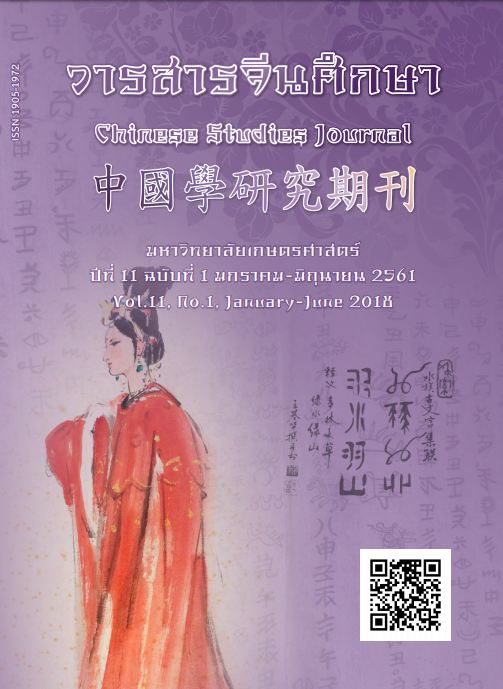บทบาทและหน้าที่ของสถาบันขงจื๊อในการนำนโยบายด้านการทูตเชิงวัฒนธรรมมาใช้ในประเทศไทย: กรณีศึกษา สถาบันขงจื๊อ มหาวิทยาลัยขอนแก่นและมหาวิทยาลัยมหาสารคาม
Main Article Content
บทคัดย่อ
ในระยะนี้ประเทศจีนได้พยายามใช้อำนาจอ่อน (soft power) ผ่านช่องทางทางการทูต คือ โปรแกรมของสถาบันขงจื่อ ซึ่งเป็นองค์กรที่เป็นแรงสนับสนุนที่เข้มแข็ง การวิจัยนี้มีวัตถุประสงค์เพื่อ 1) สำรวจและหาคำอธิบายบทบาทหน้าที่ของสถาบันขงจื่อที่เสริมอำนาจอ่อนให้กับประเทศจีน 2) ศึกษาโครงสร้างและกิจกรรมโครงการที่ขับเคลื่อนอยู่ในสถาบันขงจื่อ 3) ศึกษาประสิทธิภาพของสถาบันขงจื่อที่เสริมสร้างความเข้าใจวัฒนธรรมจีนในหมู่คนไทย การเก็บรวบรวมข้อมูลดำเนินการทำเชิงปริมาณและเชิงคุณภาพ โดยการใช้แบบสอบถามในการสารวจข้อมูลจากนักศึกษา 50 คน จากมหาวิทยาลัยสองแห่งในภาคตะวันออกเฉียงเหนือและเพื่อให้เกิดความเข้าใจชัดเจน การสัมภาษณ์เชิงลึกได้นามาใช้เพื่อหาข้อมูลด้านบทบาทของสถาบันขงจื่อ ข้อมูลที่ได้นำมาวิเคราะห์ข้อมูลเชิงพรรณนา โดยใช้โปรแกรมสาเร็จรูป SPSS เพื่อหาค่าร้อยละ ค่าเฉลี่ย และส่วนเบี่ยงเบนมาตรฐาน ข้อมูลที่ได้จากการสัมภาษณ์ในการสังเคราะห์เชิงเนื้อหา (content analysis) การวิจัยพบว่า 1) สถาบันขงจื่อเป็นองค์กรหลักในการจัดสอบและทดสอบภาษาจีน การส่งเสริมวัฒนธรรมและการแลกเปลี่ยนการศึกษาของประเทศไทยและประเทศจีน 2) สถาบันขงจื่อเป็นองค์กรที่เชื่อมประสานการต่างประเทศที่มีฐานอยู่ในมหาวิทยาลัยและอยู่ภายใต้การสนับสนุนรัฐบาล บุคลากรของไทยรับผิดชอบงานด้านการบริหารและประสานงาน ภายนอกของที่บุคลากรชาวจีน รับผิดชอบด้านการสอนและโปรแกรมแลกเปลี่ยน 3) สถาบันขงจื่อในประเทศไทยประสบความสาเร็จในช่วงทศวรรษที่ผ่านมา อย่างไรก็ตามในด้านการส่งเสริมวัฒนธรรมและค่านิยมในหมู่คนไทยยังเป็นประเด็นที่ต้องพิจารณารวมถึงประเด็นของการขับเคลื่อนอานาจอ่อนของจีนในประเทศไทย
Article Details
ผลงานทางวิชาการที่ลงตีพิมพ์ในวารสารจีนศึกษา มหาวิทยาลัยเกษตรศาสตร์ เป็นลิขสิทธิ์ของผู้เขียนหรือผู้แปลผลงานนั้น หากนำลงในวารสารจีนศึกษาเป็นครั้งแรก เจ้าของผลงานสามารถนำไปตีพิมพ์ซ้ำในวารสารหรือหนังสืออื่นได้โดยมิต้องแจ้งให้ทราบล่วงหน้า แต่หากผลงานที่ได้รับพิจารณานำลงในวารสารจีนศึกษา เป็นผลงานที่เคยตีพิมพ์ที่อื่นมาก่อนเจ้าของผลงานต้องจัดการเรื่องปัญหาลิขสิทธิ์กับแหล่งพิมพ์แรกเอง หากเกิดปัญหาทางกฎหมาย ถือว่าไม่อยู่ในความรับผิดชอบของวารสารจีนศึกษา มหาวิทยาลัยเกษตรศาสตร์ ทั้งนี้ ความคิดเห็นต่างๆ ในบทความเป็นความคิดเห็นส่วนตัวของผู้เขียน ไม่เกี่ยวกับกองบรรณาธิการวารสารจีนศึกษา มหาวิทยาลัยเกษตรศาสตร์
เอกสารอ้างอิง
Confucius Institute Headquarters. (2006). About Confucius Institute
Constitution. Retrieved June 20, 2016, from
http://www.hanban.edu.cn/confuciousinstitutes/node_7537.htm
Confucius Institute Headquarters. [n.d.]. About Confucius Institute/Classroom.
Retrieved January 18, 2017, from
http://www.hanban.edu.cn/confuciousinstitutes/node_10961.htm D’Hooghe, I. (2005). Public diplomacy in the People’s Republic of China. In The new public diplomacy (pp. 88-105). New York: Palgrave Macmillan.
Gil, J. (2009). China's Confucius Institute Project: Language and Soft Power in World Politics. The Global Studies Journal, 2(1), 59-72.
Hsiao, M. and Yang, A. (2008). Transformations in China's Soft Power toward ASEAN. China Brief, 8(22), 11-15.
Huang, Y., & Sheng, D. (2006). Dragon’s underbelly: an analysis of China’s soft power. East Asia, 23(4), 22-44.
Information Office of the State Council, the People’s Republic of China (2011). China’s Peaceful Development. Retrieved June 15, 2016, from http://english.gov.cn/archive/white_paper/2014/09/ 09/content_281474986284646.htm
Jiang, C., Sun, W., & Dai, M. (Eds.). (2013). Annual Report on the Development of Chinese Culture. Beijing: Chinese Academy of Social Sciences Press.
Lenczowski, J. (2009). Cultural Diplomacy, Political Influence, and Integrated Strategy. In M. J. Waller (Ed.). Strategic Influence: Public Diplomacy, Counter-propaganda, and Political Warfare (pp. 82-87). Washington, DC: The Institute of World Politics Press.
Maack, M.N. (2001). Books and Libraries as Instruments of Cultural Diplomacy in Francophone Africa during the Cold War. Libraries & Culture, 36 (1), 58-86. Melissen, J. (2005b). The New Public Diplomacy: Between Theory and Practice. In The New Public Diplomacy (pp. 3-27). New York: Palgrave Macmillan. Melissen, J. (Ed.). (2005a). The new public diplomacy: Soft power in international relations. New York: Palgrave Macmillan.
Nye, J. (2011). The future of power. New York, NY: Public Affairs. Nye, J. S. (2004). Soft Power: The Means to Success in World Politics. New York: Public Affairs.
Rose, R. (2008). Political Communication in a European Public Space: Language, the Internet and Understanding As Soft Power. Pacific Affairs, 46(3), 451-475.
Sharp, A. (2010). Confucius Institute adopt a sage approach to cultural understanding. Asian Currents, 66 (May), 1-4.
Shen, L. (2007). Current Situation and Outlook of Confucius Institutes in Japan. Journal of Guangdong University of Foreign Studies, 18(5), 26-29.
Shen, X. (2006). The modern value of the development of Chinese traditional culture industry. Group Economy, 5 (3), 92. Van Ham, P. (2005). Power, Public Diplomacy, and the Pax Americana. In The New Public Diplomacy (pp. 47-66). New York: Palgrave Macmillan.
Waller, M. J., 2009. Cultural Diplomacy, Political Influence, and Integrated Strategy. In Strategic Influence: Public Diplomacy, Counterpropaganda, and Political Warfare. Washington DC: Institute of World Politics Press.
Zamorano, M. M. (2016). Reframing Cultural Diplomacy: The Instrumentalization of Culture under the Soft Power Theory. Culture Unbound: Journal of Current Cultural Research, 8(2), 165-186.
Zhang, X. (2007). The current view of China among the Thai people. Southeast Asian Studies, 26(3), 58.


